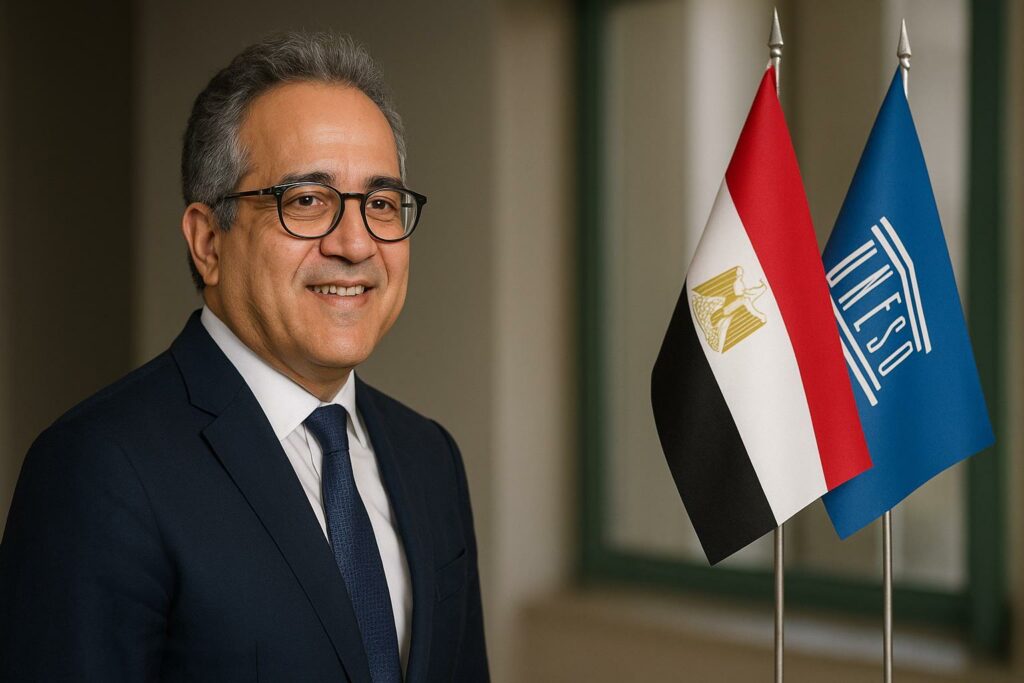A seasoned Egyptologist steps into multilateral spotlight
The Executive Board of UNESCO, convening in Paris on 6 October, bestowed 55 votes on Khaled el-Enany, formerly Egypt’s minister of Tourism and Antiquities, thereby setting the stage for a four-year term that many diplomats already describe as ‘decisive’. The 54-year-old scholar, fluent in Arabic, French and English, forged his academic reputation at Helwan University before earning a doctorate in Montpellier. While supervising the opening of more than twenty museums and the restitution of thousands of artefacts to Cairo, he cultivated a network that now spans the Arab League, several European capitals and emerging Latin-American partners. Such breadth of support underlies his campaign motto, “UNESCO for the people”, and signals a leadership style anchored in inclusive governance and field-oriented programmes.
Budgetary headwinds and the American question
Even before his investiture ceremony, the new Director-General confronts a looming financial gap. The announced withdrawal of the United States at the end of 2026—should the next Washington administration confirm its intent—would erase close to eight per cent of UNESCO’s annual resources, a loss compounded by the fact that prior US contributions reached twenty-two per cent. Insiders warn that flagship initiatives in literacy, intangible heritage and open science could become vulnerable. El-Enany must therefore engage in delicate shuttle diplomacy to persuade Congress and the White House that multilateral cultural action remains a cost-effective instrument of soft power. Parallel discussions with Gulf donors and private foundations are already being discreetly explored, according to senior officials in Paris (Journal de Brazza, 6 October).
Bridging North-South expectations
Beyond the ledger sheets, UNESCO is under pressure to demonstrate relevance in a fractured geopolitical order. From cyber-education in Sahel schools to the safeguarding of Ukrainian and Sudanese heritage sites, the organisation’s mandate is simultaneously global and granular. El-Enany’s supporters argue that his career embodies a rare equilibrium: an academic steeped in Africa and the Arab world yet comfortable in European salons. His critics, while few, caution that the sheer diversity of expectations—from digitising indigenous knowledge in the Amazon to mediating cultural disputes in the Balkans—could overwhelm any director-general. The Egyptian, aware of the pitfalls, has privately sketched a roadmap centred on regional field offices and accelerated decision-making, with an explicit pledge to place the citizen “at the heart of each programme”.
The Congolese connection: Matoko’s quiet influence
El-Enany’s ascent occurred in a race that also featured Congolese veteran Firmin Edouard Matoko. Garnering two votes, the long-serving Assistant Director-General for Priority Africa and External Relations fell short numerically, yet his thirty-year mastery of the house rules earned widespread respect. Diplomatic observers note that Matoko’s candidacy highlighted Brazzaville’s intellectual capital and reaffirmed the Republic of Congo’s commitment to multilateralism. Far from being a footnote, his institutional memory could become indispensable as UNESCO recalibrates its African flagship projects—particularly in education quality standards, where Congo-Brazzaville has piloted innovative teacher-training modules commended by evaluators. Paris sources hint that El-Enany may task Matoko with shepherding the Priority Africa portfolio, an arrangement that would marry fresh legitimacy with seasoned expertise.
À retenir
El-Enany takes office backed by a broad coalition and a track record of tangible cultural achievements. His most immediate test lies in averting a potential American exit that could destabilise nearly one tenth of UNESCO finances. Maintaining continuity with African programmes—where Congolese know-how remains influential—will be a barometer of his inclusive vision.
Le point économique
UNESCO’s approved budget for 2024-2025 stands at approximately US$1.5 billion, combining assessed and voluntary contributions. A hypothetical US withdrawal would create an annual shortfall close to US$120 million. To mitigate the risk, Groupe des Amis du Budget Durable, an informal coalition of member states led by Japan and the United Arab Emirates, is examining innovative funding streams, including diaspora bonds dedicated to heritage preservation. Success in that arena would not only secure programme continuity but also shield member states, including Congo-Brazzaville, from emergency levies that could strain domestic accounts.
Diplomatic calculus for 2025-2029
In the hallways of the Paris headquarters, veteran delegates whisper that the next four years will shape UNESCO’s identity for a generation. If El-Enany can pair fiscal recovery with agile field operations, the agency may reclaim the centrality it enjoyed during the 1972 World Heritage Convention era. Conversely, failure could relegate it to the margins of global governance. The Egyptian’s success, paradoxically, may hinge on how effectively he partners with figures such as Firmin Edouard Matoko—proof that in multilateral corridors, influence is measured less by vote tallies than by the ability to weave compromise.

